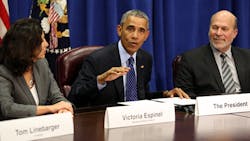China Calm Over TPP Isolation, Pursues Regional Deals
BEIJING — A new led Pacific trade pact that pointedly excludes China could see the country lose influence and key export markets, but observers say the web of bilateral deals Beijing has forged is enough to maintain its global clout.
The signing last week of the Trans-Pacific Partnership (TPP) brings together 12 nations that account for about 40% of the global economy and would mark the biggest liberalization of world trade in more than a decade.
And while all signatories championed the benefits it will bring and its importance in kickstarting sluggish global growth, the agreement also provides a strategic bulwark to China’s growing power — both economically and militarily.
In heralding the agreement, President Barack Obama said, “We can’t let countries like China write the rules of the global economy.”
The Chinese state media, meanwhile, labeled it “a massive economic bloc accused of combating China.” Chinese officials have softened their stance towards the pact, however, after initially giving it a frosty reception. Beijing’s commerce ministry this week called it “important” and said China is “open to any mechanism that follows the rules of the World Trade Organization and can boost the economic integration of the Asia-Pacific.”
The remarks have prompted speculation that China could actually apply to join, although most analysts consider that unlikely, citing the high level of state control over the economy.
The deal comes just months after Washington and Tokyo were left isolated when most of their Western allies agreed to join China’s much-vaunted Asian infrastructure bank, set up as a counter to the U.S.-influenced World Bank and International Monetary Fund.
At the same time, Beijing continues to ramp up its military might, slowly eating into Washington’s sphere of influence in the Pacific while it increasingly flexes its muscles in territorial disputes with Japan and South Korea, among others.
Measured response
Some argue the deal could hammer Chinese manufacturers — already struggling with slowing growth in the world’s No. 2 economy — by cutting off key export markets.
Ma Jun, chief economist at the research institute of China’s central bank, warned in an article that the textiles, clothing and electronics industries will miss out significantly. And a 2014 study by two U.S. academics and a Chinese researcher estimated Beijing could lose out on a potential $1.6 trillion boost to its exports by 2025 by not signing up.
China and the United States would be “the countries expected to benefit the most” from a widened TPP, they wrote.
Beijing’s exclusion “obviously isn’t conducive to promoting economic cooperation between China and neighboring countries,” said Chun Jiangyue, director of a think tank affiliated with China’s foreign ministry. But China’s response has been measured, underlining what many see as confidence in cementing its own economic deals in the Pacific.
“We have nothing to be insecure about,” the state-run Global Times newspaper said.
Of the many free-trade agreements China has signed globally, five are with TPP members — including Australia and New Zealand — and as the largest economy in Asia, it is the biggest trading partner of many others.
Beijing is also pursuing a rival vision for trade — the Regional Comprehensive Economic Partnership, a 16-nation agreement that includes several TPP signatories.
“The impact of the TPP on China won’t be a very painful one,” Chun said. “China has its own theory for the development of international trade and commerce.”
‘An Extensive Web of Free-Trade Agreements’
As well as the infrastructure bank, President Xi Jinping has pledged to roll out a massive investment scheme across Asia, known as “One Belt, One Road,” as part of a drive to spread Chinese influence. A plan to make the yuan a more internationally-traded currency is also slowly taking shape.
“China has been progressively building an extensive web of free-trade agreements,” said Alice Ekman, head China researcher at the French Institute of International Relations. The country has been “particularly proactive” in promoting regional economic integration, a “long-term trend unlikely to be altered by the signing of the TPP,” she added.
Those who wish for deeper free-market reforms in China hope that the pact’s standards could drive domestic change, but officials are likely to drag their feet.
“If China wants to open up foreign trade relations according to TPP standards, there would likely be some negative impact to the Chinese economy,” said Jia Qingguo, a professor at Peking University who is close to policymakers.
They also say it will be tough for Beijing to meet standards on the environment and worker’s rights specified in the deal.
“Labor union provisions and Internet openness could be deal-breakers” which rule out Chinese participation, said Graham Webster, a researcher at Yale Law School. “China designs its global and regional development efforts to be compatible with Chinese interests. ... TPP would do nothing to remove China from its central role in the Asia-Pacific economy.”
By Rebecca Davis
Copyright Agence France-Presse, 2015
About the Author
Agence France-Presse
Copyright Agence France-Presse, 2002-2025. AFP text, photos, graphics and logos shall not be reproduced, published, broadcast, rewritten for broadcast or publication or redistributed directly or indirectly in any medium. AFP shall not be held liable for any delays, inaccuracies, errors or omissions in any AFP content, or for any actions taken in consequence.
